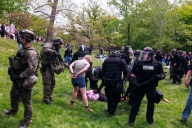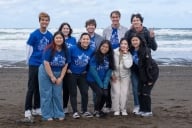You have /5 articles left.
Sign up for a free account or log in.
A group of alumni at Lee University, a Christian institution in Tennessee, organized a petition drive to protest recent statements by President Mark Walker reaffirming the university’s long-held stance, articulated in the university's "community covenant," holding that same-sex sexual relationships are prohibited by Scripture. The alumni argue in an open letter signed by about 750 people that Walker’s comments during a March 11 chapel service “were and are harmful to queer students: their mental and emotional health; their physical safety; their relationship with the college, the church, and their peers; and their academic success.”
Walker’s comments came after the university hosted Preston Sprinkle, president of the Idaho-based Center for Faith, Sexuality and Gender. University officials declined to make available a video of Sprinkle’s remarks, which the university has taken down from its website, but according to secondhand accounts, Sprinkle spoke about a friend who was assigned male at birth but identified as a woman, and who experienced same-sex attraction. The Chattanooga Free Press reported that the friend left the church but subsequently returned because of love shown by a pastor. (Sprinkle declined an interview request through a representative.)
After the talk, the university's sponsoring denomination, the Church of God, issued a statement saying that Sprinkle “addressed sexual orientation and homosexuality in a manner that was contrary to Scripture, Church of God doctrine and teachings.” Walker also addressed the issue with his own statement and during a chapel service, saying that Sprinkle’s speech was ambiguous about the need for repentance.
“The biblical view of human sexuality teaches that the only biblically valid marriage is between one man and one woman and that God does not approve or condone sexual activity between individuals of the same sex, and it requires repentance,” Walker said during the chapel service. “But all sexual misconduct requires repentance. Pornography, adultery, fornication. All sexual behavior that violates Scripture requires repentance. All sin of any kind in any of our lives requires repentance.”
Walker emphasized the need for Lee students to listen to and understand one another and to hold each other accountable for their behavior.
“We’re going to love one another by holding each other accountable,” Walker said during the chapel service. “The scriptural boundaries of the Lee community covenant are vital to the health and the safety and the Christ-centered environment we want here. Such an environment doesn’t exist where we just conduct ourselves any way we want to or live whatever pleases us. We will exercise the correction that needs to be exercised; we will exercise the discipline that needs to be exercised. We will seek to keep one another accountable so we can grow with and learn from and enjoy the best of one another.”
A group of Lee alumni who call themselves the Affirming Alumni Collective formed to support current students in the wake of Walker’s comments. The group of LGBTQ+ alumni and straight allies said in a written statement that it "was disconcerting" that the president would use a chapel service "to clarify the stance that we are not sure anyone was questioning. The stance very much felt like the university would be coming against LGBTQIA+ students."
“The chapel was about repentance, which can be a very traumatizing experience for LGBTQIA+ Christians,” Jared Powers, a 2011 Lee graduate, and Rachel Lesler, a 2015 graduate, wrote in a statement on behalf of the alumni group. “Many of us have tried to ‘pray the gay away’ to a degree that it caused us to become depressed, and many spent years hating themselves because more than just being sinful, we ourselves are something ‘different.’ The framework of only being able to maintain salvation without repentance makes it clear that LGBTQIA+ people must either choose their identity or their faith -- a choice no other ‘sinner’ must make. The message also equated being gay to being an adulterer, used an ex-gay story shared by Dr. Sprinkle, and was reminiscent of conversion therapy rhetoric. The final piece in the message called for students to ‘hold each other accountable’ for their sin, which made many students afraid they may be targeted if they were to be their true selves.”
Powers and Lesler said they are in regular contact with LGBTQ+ students at Lee.
“Some students have expressed gratitude that we exist although many have said they feel seen now more than they ever have,” they wrote. “We have also received private messages and emails from students who have never come out before, but we provided a safe place for them to share their stories. We were able to help some students navigate potentially harmful situations which seem to have been spurred by President Walker’s March 11 chapel. Our students collectively agreed that following the chapel service, it was necessary for them to be more careful on campus. And many have noted that there have been more instances of hateful behavior directed at the LGBTQIA+ community following that chapel -- our group was able to help them navigate and report those situations to appropriate authorities.”
A recent survey conducted by the surveying organization College Pulse on behalf of the Religious Exemption Accountability Project (REAP), a national organization that opposes restrictive LGBTQ policies at religious colleges, found that 11 percent of students at Christian colleges with anti-LGBT policies identify as non-heterosexual. These students, who are largely closeted on their campuses, struggle with feelings of belonging and -- as is also the case with LGBTQ+ students attending secular institutions -- are more likely than straight, cisgender peers to experience depression and anxiety. (College Pulse conducts surveys for Inside Higher Ed's Student Voice project, but Inside Higher Ed played no role in this survey.)
Yaz Mendez Nuñez, the co-executive director or Soulforce, which sponsors REAP, said there’s been a trend in recent years toward activism on LGBTQ+ rights issues by alumni of Christian colleges who are no longer beholden to the colleges’ policies.
“I hope … this mounting pressure from the alumni, from the students, and other community members will allow for more meaningful conversations that get to the heart of unrooting these kinds of violent theologies from our institutions of higher education,” Nuñez said.
Walker said in an interview he is "not aware of any hostile behavior towards any of our students since that chapel service. Any student that is harassed or threatened or bullied in any way, if authorities are made aware of it, we will deal with it. We don’t allow that on our campus of any student."
He defended his statements reaffirming the university's positions on same-sex relationships.
"I was basically saying that we love one another by holding up our part of the community covenant, and that one of the ways we do that is we do hold one another accountable to it," he said. "When I said we will bring disciplinary action or correction I wasn't talking about random people doing that to other people. I was talking about it from the standpoint of the administration or those in leadership. It wasn't talking about any one group of people; it was talking about the student body as a whole."
Walker said he welcomed the opportunity to speak with concerned alumni.
"In my talk, I invited anybody that had any questions or concerns about anything, I said to come and I'd love to sit and listen and have a conversation. I’ve had several students come up and do that," he said. “I would just simply say that our community covenant is about providing equal opportunity and equal protection and equal accountability for all of our students. That's what’s most important in showing the love to one another that we seek to do here at Lee University.”
The Affirming Alumni group said in its statement that while it formed in response to Walker's remarks, "we aren’t in opposition to him or the school."
"We all attended Lee and know what it was like to be a student there," Powers and Lesler wrote. "We know college can be a trying time for many students, whether they identify as part of the LGBTQIA+ community or not. If you add questioning your sexuality or gender into that mix, one can understand how lonely the experience can feel. Our group wants to bridge that gap -- to show students that not only can they thrive at Lee, but there is a whole beautiful community of Alum who are here to support them in any way we can. We also want to provide safe community resources, such as counseling and religious organizations, so students do not have to feel like they are navigating life alone."








